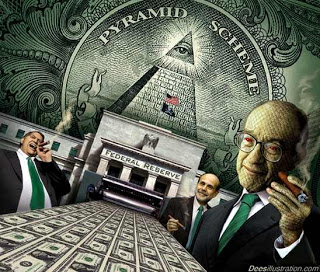Ellen H. Brown
Web of Debt
The Federal Reserve was set up by bankers for bankers, and it has served them well. Out of the blue, it came up with $12.3 trillion in nearly interest-free credit to bail the banks out of a credit crunch they created. That same credit crisis has plunged state and local governments into insolvency, but the Fed has now delivered its ultimatum: there will be no “quantitative easing” for municipal governments.
On January 7, according to the Wall Street Journal, Federal Reserve Chairman Ben Bernanke announced that the Fed had ruled out a central bank bailout of state and local governments. “We have no expectation or intention to get involved in state and local finance,” he said in testimony before the Senate Budget Committee. The states “should not expect loans from the Fed.”
So much for the proposal of President Barack Obama, reported in Reuters a year ago, to have the Fed buy municipal bonds to cut the heavy borrowing costs of cash-strapped cities and states.
The credit woes of state and municipal governments are a direct result of Wall Street’s malfeasance. Their borrowing costs first shot up in 2008, when the “monoline” bond insurers lost their own credit ratings after gambling in derivatives. The Fed’s low-interest facilities could have been used to restore local government credit, just as it was used to restore the credit of the banks. But Chairman Bernanke has now vetoed that plan.
Why? It can hardly be argued that the Fed doesn’t have the money. The collective budget deficit of the states for 2011 is projected at $140 billion, a mere drop in the bucket compared to the sums the Fed managed to come up with to bail out the banks. According to data recently released, the central bank provided roughly $3.3 trillion in liquidity and $9 trillion in short-term loans and other financial arrangements to banks, multinational corporations, and foreign financial institutions following the credit crisis of 2008.
The argument may be that continuing the Fed’s controversial “quantitative easing” program (easing credit conditions by creating money with accounting entries) will drive the economy into hyperinflation. But creating $12.3 trillion for the banks — nearly ten times the sum needed by state governments — did not have that dire effect. Rather, the money supply is shrinking – by some estimates, at the fastest rate since the Great Depression. Creating another $140 billion would hardly affect the money supply at all.
Why didn’t the $12.3 trillion drive the economy into hyperinflation? Because, contrary to popular belief, when the Fed engages in “quantitative easing,” it is not simply printing money and giving it away. It is merely extending CREDIT, creating an overdraft on the account of the borrower to be paid back in due course. The Fed is simply replacing expensive credit from private banks (which also create the loan money on their books) with cheap credit from the central bank.
So why isn’t the Fed open to advancing this cheap credit to the states? According to Mr. Bernanke, its hands are tied. He says the Fed is limited by statute to buying municipal government debt with maturities of six months or less that is directly backed by tax or other assured revenue, a form of debt that makes up less than 2% of the overall muni market. Congress imposed that restriction, and only Congress can change it.
That may sound like he is passing the buck, but he is probably right. Bailing out state and local governments IS outside the Fed’s mandate. The Federal Reserve Act was drafted by bankers to create a banker’s bank that would serve their interests. No others need apply. The Federal Reserve is the bankers’ own private club, and its legal structure keeps all non-members out.
RELATED ARTICLES:
Unemployed: Stop Searching for a Job and Learn to Forage
The After The Fed Debate Begins: Greenbackers vs. Goldbugs



Be the first to comment on "The Fed Has Spoken: No Bailout for Main Street"